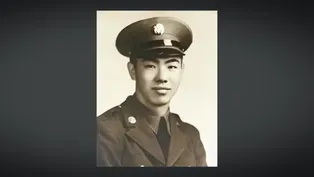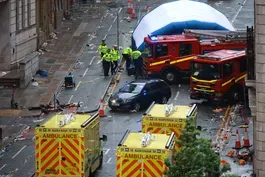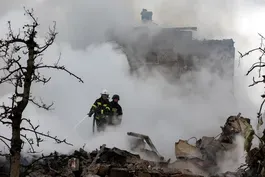
'Putin's Sledgehammer' reveals how Wagner Group gained power
Clip: 5/26/2025 | 9m 19sVideo has Closed Captions
'Putin's Sledgehammer' reveals how the Wagner Group became so powerful it threatened him
A new book delves deep into the rise and fall of the Russian paramilitary Wagner Group and its close ties to Vladimir Putin. Nick Schifrin sat down with Candace Rondeaux, author of "Putin's Sledgehammer: The Wagner Group and Russia’s Collapse into Mercenary Chaos."
Problems with Closed Captions? Closed Captioning Feedback
Problems with Closed Captions? Closed Captioning Feedback
Major corporate funding for the PBS News Hour is provided by BDO, BNSF, Consumer Cellular, American Cruise Lines, and Raymond James. Funding for the PBS NewsHour Weekend is provided by...

'Putin's Sledgehammer' reveals how Wagner Group gained power
Clip: 5/26/2025 | 9m 19sVideo has Closed Captions
A new book delves deep into the rise and fall of the Russian paramilitary Wagner Group and its close ties to Vladimir Putin. Nick Schifrin sat down with Candace Rondeaux, author of "Putin's Sledgehammer: The Wagner Group and Russia’s Collapse into Mercenary Chaos."
Problems with Closed Captions? Closed Captioning Feedback
How to Watch PBS News Hour
PBS News Hour is available to stream on pbs.org and the free PBS App, available on iPhone, Apple TV, Android TV, Android smartphones, Amazon Fire TV, Amazon Fire Tablet, Roku, Samsung Smart TV, and Vizio.
Providing Support for PBS.org
Learn Moreabout PBS online sponsorshipLAURA BARRON-LOPEZ: Over the past decade, one of Russian President Vladimir Putin's top henchmen was the man behind Russia's most notorious mercenary forces.
Yevgeny Prigozhin was Putin's confidant, enforcer and the mastermind of the paramilitary Wagner Group, once a trusted ally of the Kremlin.
His fate took a dramatic turn, ending in a mysterious plane crash.
A new book delves deep into the rise and fall of Prigozhin in Putin's Russia.
Nick Schifrin recently sat down with the author.
NICK SCHIFRIN: Long ago, the sledgehammer was an icon of Soviet industry.
But in Vladimir Putin's Russia, it's been transformed into a symbol of savagery and an emblem of Russian resurgence, thanks to the now notorious paramilitary group Wagner.
Wagner was born out of St. Petersburg, where Vladimir Putin rose in politics and first met Yevgeny Prigozhin, the man who had become known as Putin's chef, across Africa, to the digital battlefield of the 2016 election, to Eastern Ukraine.
Wagner and Prigozhin became not only mercenary soldiers.
They projected Russian power as an integral instrument for Putin's confrontation with the West and attempt to reshape the world order.
That is the story told in "Putin's Sledgehammer: The Wagner Group and Russia's Collapse into Mercenary Chaos" by Candace Rondeaux, who joins me here.
Candace Rondeaux, thanks very much.
Welcome to the "News Hour."
CANDACE RONDEAUX, Author, "Putin's Sledgehammer: The Wagner Group and Russia's Collapse into Mercenary Chaos": Thank you.
NICK SCHIFRIN: You write that Wagner became an advertisement for a more muscular Russia, one determined to rewrite the rules of the international order to its advantage.
How so?
CANDACE RONDEAUX: Well, in a couple different ways.
The Wagner Group really reshaped Russia's image as a great power, made it sort of more -- look more agile, more powerful than perhaps it really is.
Most importantly, it gave the sense that Russia could reach anywhere at any time.
And what it really showed was that Vladimir Putin's sort of way of war or vision of way of war was something that was saleable, marketable, something that would appeal to strongman dictatorships.
And, today, it's still as a viable option available to anybody who wants to consolidate power.
NICK SCHIFRIN: Take us back to the beginning.
How did you end up living in, as you write, a run-down student dorm in St. Petersburg in the mid-'90s, the very same place that launched Putin in the 1990s, we look at him back there, and launched Yevgeny Prigozhin?
CANDACE RONDEAUX: Yes, the young deputy mayor.
I went there as an exchange student.
It was my final year of college.
I'd studied Russian since I was 14 years old, so it'd been a big part of my life.
And this is 1995-'96.
And Putin is actually kind of the right-hand man for the mayor at the time.
This is the time when you're seeing, with the collapse of the Soviet Union and sort of the remaking of Russia, oil, gas, guns the export of weapons are the big-ticket items for Russia's economy and its exports.
There's a revival of those industries.
And, at the same time, there's this kind of marriage of convenience that happens between the mafia, the former KGB, the sort of security agencies, and then this kind of class of veterans who'd come back from Afghanistan and were really out of sorts.
That kind of marriage led to the rise of this kind of network of sort of mafia-infused mercenary networks.
NICK SCHIFRIN: Out of that scene, someone like Prigozhin could meet someone like Putin, right?
CANDACE RONDEAUX: Yes, that's right.
I mean, Prigozhin is a marketing genius.
This is a guy who takes a hot dog stand, builds it into an empire of kiosks, and then builds it sort of a restaurant empire, basically.
He becomes a caterer to Vladimir Putin and to the Kremlin.
And, ultimately, he finds a way to kind of become the favorite, right, of Putin.
At that time, Russia was also changing the way it dealt with the world.
And, most notably, the turning point is the Russian-Georgian war of 2008, where you had this five-day clash between Russian forces, Georgian forces.
Russia won, but kind of barely.
It revealed the weakness of the conventional military force.
There's an effort to privatize the military, at least part of the military.
And that's when Prigozhin starts to pick up all these defense contracts.
He becomes the caterer to the military.
Fast-forward to 2011, when Putin is on the rails politically, right?
He's coming back.
He's trying to make a comeback as president.
And there's massive protests all across Moscow, all across St. Petersburg.
And it's Prigozhin who steps in with an online social media campaign, pro-Putin, anti-Navalny, anti-West, anti-Clinton.
And he uses the Internet Research Agency.
That's the first instance where you see it consolidated.
He was not only given permission, I think he was probably encouraged to work on behalf of Russia's interest, in particular, the Kremlin's interest.
NICK SCHIFRIN: You write that Putin needed to counter the U.S. and NATO influence, but do so on the cheap without direct confrontation and with plausible deniability.
How did Wagner, how did the mercenaries play into that?
CANDACE RONDEAUX: Yes, this is crucial to understand about sort of the emergence of the Wagner Group.
Russia was never prepared and still to this day would have challenges facing off against the United States and against the NATO alliance.
Putin understood this intrinsically, and the ways in which Russia was not prepared to really go head on against NATO.
What Wagner did was solve that problem.
It created a pathway for indirect confrontation, for deception operations.
They were deployed essentially as a sort of contingent force, first to Crimea, Donbass, and then eventually to Syria.
NICK SCHIFRIN: Right.
CANDACE RONDEAUX: And this was all done under the cover of the idea that they were a private military security company.
Now, in reality, of course, they were very attached to state enterprises.
Without those enterprises, there would be no Wagner Group.
This is essentially the army of Russia's state enterprises.
NICK SCHIFRIN: Fast-forward to the full-scale invasion in 2022.
Ukraine is, as you put it, where Wagner comes out of the shadows, major part of the actual fighting in Eastern Ukraine,so both essential to what Putin was trying to achieve, but also was Prigozhin's downfall.
CANDACE RONDEAUX: The more he came out of the shadows, the less useful he was for this grand deception that Putin was trying to kind of foist on the world, which is that we're not at war.
It's a special military operation.
But, in Donbass, once he finally -- once Prigozhin finally kind of marches on Bakhmut, this epic battle, hundreds of guys dying each day on each side, the more he beats his chest, the more he becomes a liability for Vladimir Putin.
You cannot overstate the connection between the war crimes that the Wagner Group is committing, not just in Bakhmut, but across parts of Eastern Donbass, and Putin's kind of fear that that too would become a political liability and would make it difficult to negotiate a way out.
NICK SCHIFRIN: Prigozhin launches his coup.
He dies in a fiery praying crash.
But does that mean that the Kremlin stops the work he's doing?
CANDACE RONDEAUX: Oh, by no means.
This force is transforming into what we now know is the Africa Corps or the Expeditionary Corps, the same guys, same commanders, same command structure, just a new label, new name, and a little bit more control.
That's just one part of Wagner's transformation, but another part that people don't know much about is, they have been very keen and part of these sabotage operations that we have been seeing in Poland.
NICK SCHIFRIN: Across Europe.
CANDACE RONDEAUX: Across Europe.
NICK SCHIFRIN: So, you end the book with this point, that whether Wagner remains a potent global force and a model for other adventurous authoritarians will depend on whether international efforts to expose and prosecute Russian paramilitaries gain traction.
Why, in your opinion, is accountability the best way to confront this?
CANDACE RONDEAUX: When you have accountability for atrocities, the number one thing it does is, create this kind of barrier, this kind of risk aversion.
And I think what we're seeing now, we have seen one prosecution of a Wagner-affiliated fighter in Finland.
There is an appetite in Europe to push back against this, this idea of hybrid warfare, right, actors who look to be private, but in actual fact are working on behalf of the state.
I think the more we work for accountability, we sort of do, I think, justice for victims of war crimes in Ukraine, Syria, elsewhere, the more this will be a prophylactic against anybody trying this again, we hope.
NICK SCHIFRIN: Candace Rondeaux.
The book is "Putin's Sledgehammer: The Wagner Group and Russia's Collapse into Mercenary Chaos."
Thank you very much.
CANDACE RONDEAUX: Thank you.
Amy Walter and Jasmine Wright on Trump's big bill
Video has Closed Captions
Clip: 5/26/2025 | 11m 12s | Amy Walter and Jasmine Wright on how Senate Republicans feel about Trump's big bill (11m 12s)
Catholic Relief Services faces uncertain future after cuts
Video has Closed Captions
Clip: 5/26/2025 | 6m 45s | Catholic Relief Services faces uncertain future after Trump cuts aid funding (6m 45s)
How young Democrats are pushing to redefine the party
Video has Closed Captions
Clip: 5/26/2025 | 3m 20s | How young Democratic candidates are pushing to redefine the party's future (3m 20s)
Japanese American WWII vet built bridges between cultures
Video has Closed Captions
Clip: 5/26/2025 | 8m 50s | Japanese American veteran built bridges between cultures after WWII (8m 50s)
News Wrap: Driver plows into crowd of people in Liverpool
Video has Closed Captions
Clip: 5/26/2025 | 6m 39s | News Wrap: Driver plows into crowd of fans celebrating Liverpool FC championship (6m 39s)
Russia escalates drone attacks on Ukraine
Video has Closed Captions
Clip: 5/26/2025 | 10m 2s | Russia escalates assault on Ukraine with massive drone attacks on cities (10m 2s)
Providing Support for PBS.org
Learn Moreabout PBS online sponsorshipSupport for PBS provided by:
Major corporate funding for the PBS News Hour is provided by BDO, BNSF, Consumer Cellular, American Cruise Lines, and Raymond James. Funding for the PBS NewsHour Weekend is provided by...

















